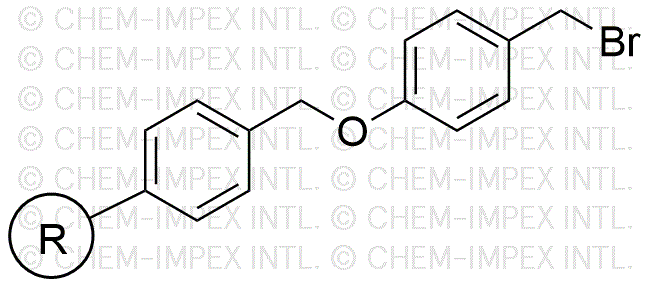|
4-Benzyloxybenzyl bromide resin is widely utilized in research focused on:
- Solid-Phase Peptide Synthesis: This resin serves as a support for synthesizing peptides, allowing for efficient coupling of amino acids while minimizing side reactions.
- Drug Discovery: It is used in combinatorial chemistry to create diverse libraries of compounds, facilitating the identification of potential drug candidates.
- Bioconjugation: The resin can be employed to attach biomolecules to surfaces or other compounds, enhancing the development of targeted therapies and diagnostics.
- Material Science: It finds applications in the creation of functionalized materials, contributing to advancements in sensors and catalysts.
- Research on Chemical Reactions: This resin allows chemists to study reaction mechanisms in a controlled environment, providing insights that can lead to more efficient synthetic methods.
General Information
Properties
Safety and Regulations
Applications
4-Benzyloxybenzyl bromide resin is widely utilized in research focused on:
- Solid-Phase Peptide Synthesis: This resin serves as a support for synthesizing peptides, allowing for efficient coupling of amino acids while minimizing side reactions.
- Drug Discovery: It is used in combinatorial chemistry to create diverse libraries of compounds, facilitating the identification of potential drug candidates.
- Bioconjugation: The resin can be employed to attach biomolecules to surfaces or other compounds, enhancing the development of targeted therapies and diagnostics.
- Material Science: It finds applications in the creation of functionalized materials, contributing to advancements in sensors and catalysts.
- Research on Chemical Reactions: This resin allows chemists to study reaction mechanisms in a controlled environment, providing insights that can lead to more efficient synthetic methods.
Documents
Safety Data Sheets (SDS)
The SDS provides comprehensive safety information on handling, storage, and disposal of the product.
Product Specification (PS)
The PS provides a comprehensive breakdown of the product’s properties, including chemical composition, physical state, purity, and storage requirements. It also details acceptable quality ranges and the product's intended applications.
Certificates of Analysis (COA)
Search for Certificates of Analysis (COA) by entering the products Lot Number. Lot and Batch Numbers can be found on a product’s label following the words ‘Lot’ or ‘Batch’.
*Catalog Number
*Lot Number
Certificates Of Origin (COO)
This COO confirms the country where the product was manufactured, and also details the materials and components used in it and whether it is derived from natural, synthetic, or other specific sources. This certificate may be required for customs, trade, and regulatory compliance.
*Catalog Number
*Lot Number
Safety Data Sheets (SDS)
The SDS provides comprehensive safety information on handling, storage, and disposal of the product.
DownloadProduct Specification (PS)
The PS provides a comprehensive breakdown of the product’s properties, including chemical composition, physical state, purity, and storage requirements. It also details acceptable quality ranges and the product's intended applications.
DownloadCertificates of Analysis (COA)
Search for Certificates of Analysis (COA) by entering the products Lot Number. Lot and Batch Numbers can be found on a product’s label following the words ‘Lot’ or ‘Batch’.
*Catalog Number
*Lot Number
Certificates Of Origin (COO)
This COO confirms the country where the product was manufactured, and also details the materials and components used in it and whether it is derived from natural, synthetic, or other specific sources. This certificate may be required for customs, trade, and regulatory compliance.


